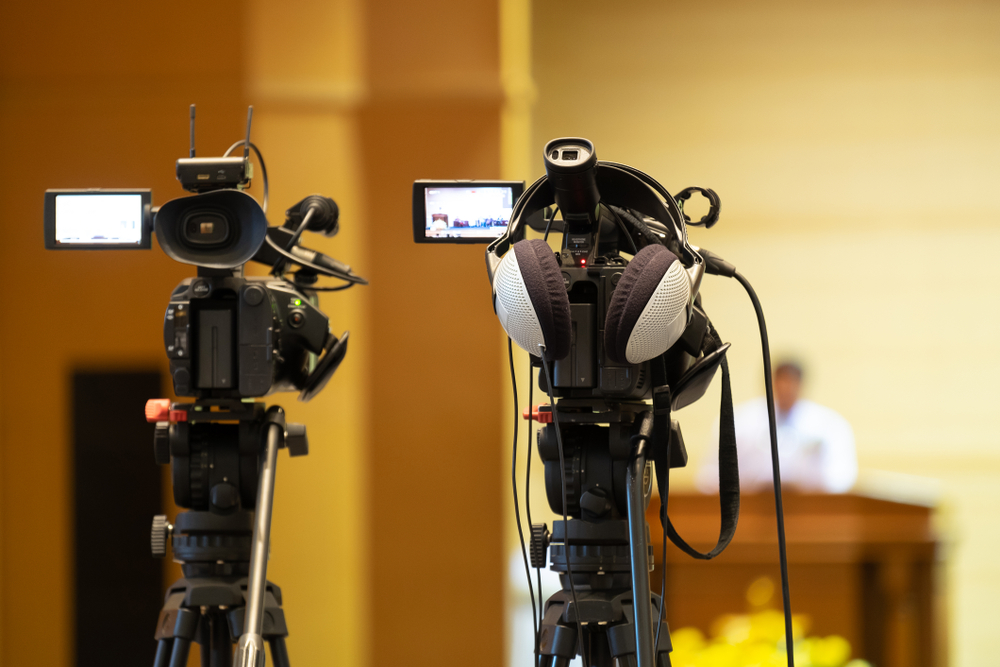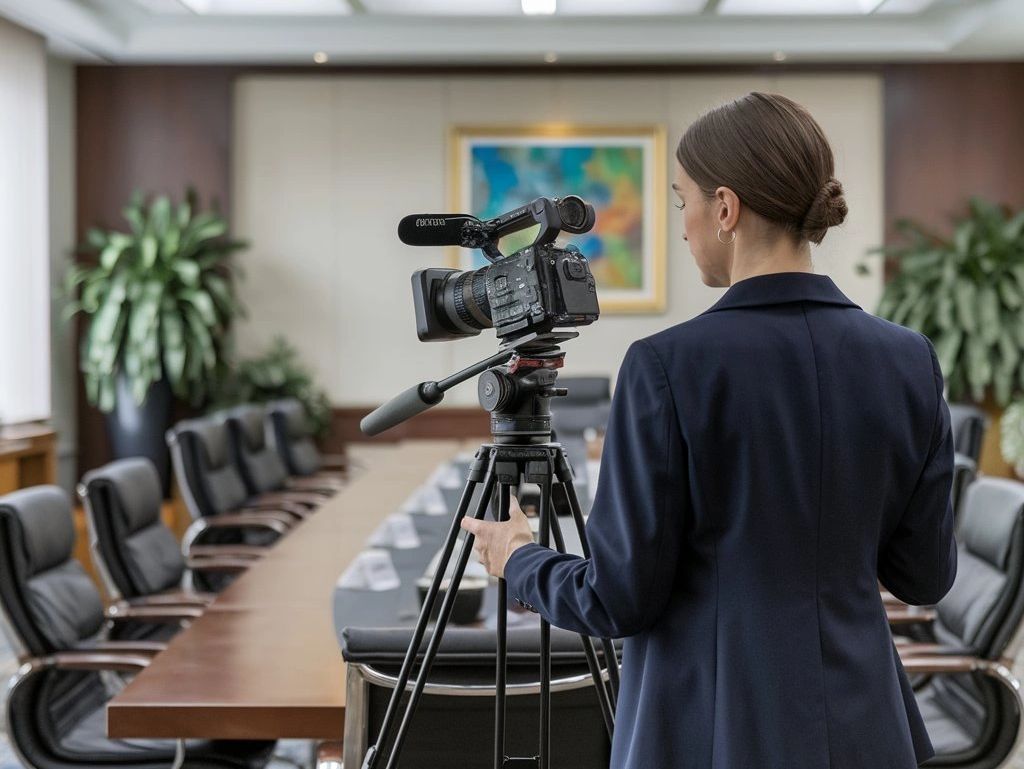A step-by-step guide to legal video depositions: What attorneys need to know
The Importance of Lawful Video Clip Depositions in Modern Legal Services: What You Must Know
Lawful video clip depositions have become necessary in today's lawful landscape. They provide a multidimensional sight of witness testimonies that conventional transcripts simply can not match. By catching both verbal and non-verbal interaction, these depositions improve the general understanding of a witness's integrity. However, the performance of video depositions rests on numerous variables, including conformity with legal requirements and best methods (legal video depositions). Checking out these aspects discloses their real value in contemporary legal solutions
What Are Lawful Video Depositions?
Lawful video depositions serve as an important device in the lawsuits process. They include taping witness statements in a video clip style, capturing both non-verbal and verbal interaction. This technique enables attorneys to document the temperament, expressions, and reactions of witnesses, supplying a richer context for the testimony. Usually performed in a controlled environment, these depositions are led by attorneys who ask questions while a stenotype reporter records the discussion. The resulting video can be vital for trial prep work, as it makes it possible for legal representatives to assess the reputation of witnesses and fine-tune their techniques. Additionally, legal video clip depositions can be utilized in numerous legal contexts, varying from civil conflicts to criminal cases. The aesthetic and acoustic aspects of video clip depositions boost the presentation of evidence, making it a vital part in the contemporary lawful landscape. Generally, they add significantly to the effectiveness and efficiency of legal process.

Benefits of Video Depositions Over Typical Techniques
Video clip depositions use numerous advantages compared to typical techniques of taking witness testimonies. One substantial benefit is the capacity to capture both aesthetic and audio components, offering an extra thorough document of the witness's declarations. This twin layout enhances clearness and allows attorneys to reference specific subtleties during trial preparation. In addition, video clip depositions help with remote participation, making it simpler for witnesses who may be inaccessible for in-person appearances because of geographical constraints or health issues.Moreover, video clip depositions can speed up the overall deposition process, reducing the moment and costs connected with traveling and logistics. They also improve accessibility, as tape-recorded depositions can be quickly shared amongst lawful teams and referenced at any kind of time. This benefit adds to far better instance monitoring and preparation. Generally, video depositions represent a modern, efficient approach to collecting witness testimonies, aligning with the developing demands of the legal career.
The Function of Body Language and Tone in Testimonies

In lawful video clip depositions, body language and tone play essential duties in conveying a witness's trustworthiness and dependability. Nonverbal hints can offer insights right into a witness's emotional state, influencing just how their testament is viewed. Recognizing the impact of these components is necessary for lawyers and jurors alike when examining the reliability of a testimony.
Nonverbal Communication Insights
While verbal interaction is often emphasized in lawful testaments, nonverbal hints such as body language and tone play a necessary duty in communicating credibility and emotion. Viewers of depositions might keep in mind that a witness's stance, motions, and faces can considerably influence understandings of reliability. Constant eye get in touch with may signify self-confidence, while preventing gaze might recommend deceit or discomfort. Likewise, the intonation-- its pitch, volume, and speed-- can impart sensations of genuineness or unpredictability. Lawful specialists have to be attuned to these nonverbal signals, as they usually offer important context that matches talked words. Comprehending these subtleties can enhance the efficiency of depositions and affect the end result of legal proceedings.
Emotional Tone Influence
The emotional tone communicated during legal testimonies significantly impacts exactly how a witness is perceived. Body language, vocal inflections, and facial expressions play crucial duties fit the narrative of a statement. A witness showing confidence with constant eye get in touch with and a tranquil tone can instill a sense of reliability and engagement. On the other hand, indications of anxiety, such as fidgeting or an unsteady voice, might bring about suspicion regarding their account. The nuances of emotional expression can influence the analysis of truths, making it crucial for attorneys to acknowledge these cues. In video depositions, the auditory and visual components integrate, emphasizing the value of psychological tone in communicating genuineness and reliability within the legal procedure.
Credibility and Trustworthiness
An important consider establishing reputation and reliability throughout testaments lies in the witness's body movement and tone of voice. Onlookers typically count on non-verbal cues-- such as eye call, position, and motions-- to assess a witness's genuineness. As an example, a witness who maintains eye get in touch with and shows open body movement may be viewed as even more sincere and trustworthy than one who stays clear of eye contact or appears shut off. Furthermore, intonation plays a necessary role; a steady, tranquil tone can reinforce the credibility of the statement, while fluctuations in pitch or quantity may elevate uncertainties. Ultimately, the mix of body movement and vocal tone greatly affects how a witness's declarations are received and analyzed in a legal context.
Finest Practices for Carrying Out Video Clip Depositions
Carrying out video depositions requires cautious preparation and implementation to ensure a clear and efficient presentation of testimony. It is vital to select a silent, well-lit place to lessen distractions and protected optimal video quality. The devices ought to be tested beforehand, including cameras, microphones, and lighting, to stay clear of technical issues throughout the deposition.Next, parties involved need to evaluate the layout and procedures beforehand, making certain that everyone comprehends their roles. The deponent needs to be informed on the procedure, consisting of exactly how to react plainly and concisely.Additionally, maintaining a professional temperament throughout the session is important. This consists of avoiding from talking over each other and validating that all inquiries are directed properly. It is critical to tape-record the deposition in a style that allows for very easy playback and testimonial, maintaining the integrity of the testament for future use.
Lawful Factors To Consider and Compliance Issues
Exactly how do legal considerations and compliance problems impact the effectiveness of video clip depositions? Lawyers have to browse a complicated landscape of policies, ensuring that video depositions stick to administrative policies and criteria. Conformity with laws worrying personal privacy, consent, and tape-recording approaches is crucial. As an example, obtaining specific permission from all celebrations involved is essential to stay clear of legal repercussions.Additionally, the admissibility of video evidence in court can hinge on conformity with procedural requirements. Making certain that the tools made use of satisfies technological standards is also important, as low quality can weaken the deposition's reliability.Moreover, lawyers need to be aware of any kind of certain state legislations that govern video depositions, as these can vary considerably. Failing to deal with these factors to consider can not only endanger the stability of the deposition yet likewise influence the overall instance technique, inevitably impacting the client's lawful outcomes.
Just How Video Depositions Effect Court Understanding
While video depositions can work as powerful devices in lawful proceedings, their influence on court assumption is substantial. The acoustic and visual components of video recordings supply jurors with a more complete understanding of witness behavior, integrity, and emotional responses. This multimedia strategy can improve the jurors' ability to evaluate the integrity of testimony compared to typical text-based transcripts.Moreover, video depositions permit jurors to observe body language, tone of voice, and face expressions, every one of which can influence their interpretation of the witness's statements. The visibility of a witness on display can humanize them, fostering empathy and connection, which might persuade jurors' opinions. On the other hand, a witness who shows up unreliable or evasive on video may website link bring about adverse assumptions that influence a court's decision. Inevitably, the dynamic nature of video depositions plays a crucial role fit just how jurors interpret proof and reach their decisions.
The Future of Video Clip Depositions in Legal Technique
As developments in modern technology continue to reshape the lawful landscape, the future of video depositions is positioned for significant advancement. Developments such as synthetic knowledge, digital reality, and improved video conferencing tools are anticipated to improve the deposition process and boost access. Legal professionals might utilize AI-driven analytics to examine witness reliability and case stamina extra effectively.Moreover, the combination of digital truth might permit juries to experience immersive simulations of depositions, providing much deeper context and understanding. In addition, the pattern towards remote depositions is likely to continue, providing greater flexibility for clients and lawyers alike.As remote work comes to be increasingly normalized, video clip depositions will likely come to discover here be basic technique, minimizing costs and time restraints associated with traditional techniques. Overall, these technical developments guarantee to improve the performance, effectiveness, and availability of video depositions in lawful technique, ultimately transforming how lawyers prepare for trial.
Frequently Asked Inquiries
Just How Much Do Legal Video Depositions Generally Price?

Can Video Depositions Be Utilized in Any Type Of Sort Of Instance?
Video depositions can be utilized in various sorts of instances, including civil, criminal, and household regulation. Their flexibility enables lawyers to existing witness testimonies successfully, adjusting to the certain needs of various legal scenarios.
What Equipment Is Needed for a Video Clip Deposition?
To perform a video deposition, essential equipment includes a top quality cam, microphone, lights, and a dependable recording gadget. Furthermore, a computer system with editing and enhancing software might be needed for post-production and formatting the final video.
For how long Does a Typical Video Clip Deposition Last?
A regular video clip deposition lasts in between 2 to four hours, depending on the intricacy of the situation and the variety of questions posed. Extended sessions might happen, however breaks are normally included for individual comfort.

Are Video Clip Depositions Admissible in Court?
Video depositions are usually permissible in court, given they abide by legal requirements and rules of proof. Their use boosts quality and protects witness testimony, helping in the judicial procedure throughout hearings and tests. Legal video depositions have actually come to be crucial in today's legal landscape. Furthermore, legal video depositions can be used in numerous lawful contexts, ranging from civil disputes to criminal instances. Additionally, video clip depositions facilitate remote engagement, making it less complicated for witnesses who might be inaccessible for in-person appearances due to geographical constraints or wellness issues.Moreover, video depositions can expedite the general deposition procedure, reducing the time and costs associated with traveling and logistics. Making certain that the tools made use of fulfills technological requirements is likewise vital, as inadequate high quality can weaken the deposition's reliability.Moreover, attorneys need to be mindful of any particular state laws that regulate video depositions, as these can differ significantly. Furthermore, the fad toward remote depositions is likely to persist, providing greater flexibility for customers and attorneys alike.As remote job comes to be progressively normalized, video clip depositions Check This Out will likely become common practice, minimizing costs and time restrictions connected with conventional techniques.